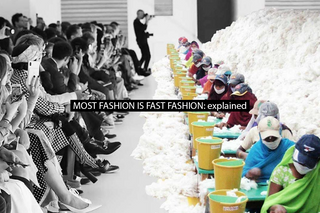Although it may seem trendy and inexpensive, fast fashion is an absurb model, perpetuating waste & exploitation detrimental to garment workers and our environment.
Fast fashion is a current, in-demand “trend” that has ruined the fashion industry.
Encompassing all brands following a fast manufacture for low-cost products scheme. This "business model" encourages over-consumption of poor quality if not single use goods, a.k.a “keeping up with the latest fashion trends”.
From our point of view, fast fashion is a race that most brands are still participating in. The majority of “Australian” clothing labels are competing against each other to release the next ‘must-have,’ ‘trending’ collection, whilst still offering the lowest possible cost!
This ultimately results in an influx of constant over production and around the clock manufacturing, without any consideration for garment value, longevity or end of life. This model is creating a sickening amount of non-biodegradable clothing waste that we simply cannot manage.
In addition to the unnecessary strain on landfills, our beaches and oceans the effects of fast fashion stretch far wider than just impacting the environment, social exploitation is severely overlooked in the western world, as many still “turn a blind eye” to accept this disposable fashion model.
“The fashion industry is the second largest polluter in the world … Fast fashion has a lot to answer for.”
- Emma Watson

Are we being "programmed" or "manipulated?"
Fast fashion is a challenging and critical matter that must be taken seriously by everyone - especially within the fashion industry, from shoppers to designers and manufacturers alike.
4 simple words, 4 different meanings, 4 factors that manipulate us into buying fast fashion...
- Cost.
- Convenience.
- Addiction.
- Marketing.
The influence from one or all of these factors is usually enough of a temptation to overlook ethics if our understanding of ethical / sustainable clothing brands is not yet solid.
When was the last time you gave into temptation?
What value did the product bring you?
Where will it end up after you are finished with it?
If we desire a thriving, beautiful earth full of resources for future generations, we must become strong and grounded against temptations.
We must re-wire our hunger for instant gratification and find long lasting pleasure by investing in brands that are future focused, for an even more beautiful future!
SHOP: ECOCIOUS ECO STORE
SUSTAINABLE BRANDS & ETHICAL AUSTRALIAN CLOTHING,
CLEAN BEAUTY, ORGANIC SKIN CARE, ECO FRIENDLY PRODUCTS.
Forget the fleeting pleasure from taking the easy route, understand that patience will provide the ultimate reward, once more join our movement.
The History of "Fast Fashion"
Before fast fashion emerged two decades ago, fashion trends were seasonal, and clothing production was limited.
For example, if you were to buy a beautiful merino wool cardigan in Australia, back in 1970 that garment would have been grown, sewn and produced on home soil. Now, it is so rare to find an Australian brand that is actually made and manufactured here in Australia!
With the exception of a handful of ethical Australian clothing brands, most Australian clothing brands turn to neighbouring manufacturing countries across Asia to create their collections.
This is due to a variety of factors which stem from our own governments changes in policies, tariffs and incentives towards textile manufacture which have resulted in production being undeniably more cost effective to manufacture overseas.
But why is this?
Fast fashion has deemed its popularity as ever in recent years, but it wasn't until the early 2000s that it truly took over the international fashion market.
The swift development of fast fashion was largely a consequence of the globalisation of the clothing market, as there was a significant growing interest for affordable and fashionable pieces of clothing.

Globalisation and technological developments offshore pushed Australian clothing brands to outsource manufacturing to developing countries with reduced labour costs. This enticed businesses to embrace the concept of making garments quicker at a significantly lower cost.
Zara, H&M and Forever 21 were some of the first clothing retailer’s to engage in the fast fashion model.
Fast fashion has skyrocketed in popularity again during the Covid-19 pandemic.
Which launched a plethora of new e-commerce fashion labels, as well as existing conglomerates increasing their already amassed influence.
As lockdowns and restrictions were put into place, many of us relied on the world of online shopping. Specifically, turning to online Australian clothing brands, pumping out "WFH collections" from the cheapest manufacturer they could find.

Is Fast Food comparable to Fast Fashion?
We all love the idea of spending less money. However, we are so infatuated with the cheapest option, that we are blindsided by the harsh truth. This can be seen on the ever so cheap menu at McDonalds.
McDonalds’ business model is focused around cost leadership, convenience, addiction and an extremely smart marketing plan.
It's time that we give more thought about the clothes we consume, like we do with the food we eat.
The perception of comparing the two models signifies that simply prioritising convenience and cost always ends up costing us more in the long run.
Just like fast food is a "quick fix" for providing low quality, nutrient-less food instantly, fast fashion is an accessible option for clothing. In the western world shoppers have been trained to hunt for a deal rather than exploring value.
Fast fashion is like fast food. After the sugar rush, it just leaves a bad taste in your mouth.
- Livia Firth
If you're considering purchasing a dress or top from Supre, Glassons, H&M, Zara, Cotton on... (the list goes on forever) at a price point similar to a fast food meal, I encourage you to ponder how this "cost" is possible, for you, the business and all involved along the supply chain.
Where is this top being manufactured?
How is it possible to be this cheap?
Who is really paying for it?
Today, fast food is widely considered to be unhealthy, yet fast fashion is not often noted as harmful to our health - even with outstanding evidence that pinpoints it as the second largest polluter, globally.
Environmental Impact
Fast fashion demands a huge quantity of both natural and man-made resources, including fossil fuels, water, energy and raw materials. When not considered sustainably: with end of life and or circular models in place, our environment suffers tremendously.
Here are the most pressing environmental impacts:
- Microfiber/micro plastic pollution: Without polyester, the growth of fast fashion would be unimaginable. After washing clothing made with polyester, microplastics end up in rivers and oceans, killing marine life and damaging our environment. (Read our article on micro plastics: HERE)
- Waste production: As soon as a clothing item has been produced and sold online/in store, another trend is already being manufactured. The ongoing cycle shows that the clothing is intended to be worn only a few times before being discarded. This generates huge quantities of textile waste, which ends up in landfills and will take 200+ years to break down into microplastics.
On average, each Australian tosses 24kg of fashion waste into landfill every year.
- Carbon emissions: Fast fashion is all about high quantities of stock and a quick product turnover. Both of which need a significant amount of energy and resources to produce. Noting that most brands manufacture offshore, consider these huge shipments being hauled for every drop. Not to mention re-cuts, off-cuts, discarded samples - the energy intensity of this industry is greatly contributing our position within climate change.
Social Impact
Who made my clothes?
What are the social impacts?
- Exploitation of workers.
- Child labour.
- Poor working conditions.
- Discrimination.
- Waste of resources that could have been used to improve the lives of others.
The fast fashion industry is recognised for its unethical methods, such as poor pay, excessive hours, and hazardous working conditions for workers.
Many of the individuals who are creating our garments live in underdeveloped countries where labour and health/safety rules are not enforced, resulting in human rights violations and severe societal consequences.
Did you know that less than 2% of the 75 million garment workers globally earn a living income?
Did you know that 75% of garment workers are women aged 18 to 24?
By "turning a blind eye" to purchase from unethical fast fashion brands you are not only participating but supporting the profit from trapping a generation of women into poverty, deeming them unable to satisfy their own and potential children's fundamental basic rights and needs.
And for what?
A dress we might wear once...

The Importance of Our Behaviour
Fast fashion has altered our perception and the way we purchase clothing.
With bargains, flash sales and the continually changing trends, it's become second nature to join the bandwagon of overconsumption.
Consumer behaviour is essential to the fast fashion sector.
So, what really is the role of the buyer?
Let’s unpack it...
Impulse Buying:
Lack of Consideration for Quality:
Fast fashion products are generally low-cost and poorly made.
Manipulation from Social Media:
Although influencers can wear whatever they want, promote what they like and partner with every brand on the internet, their choice to promote trends within the fast fashion sector is driving a culture of conformity and excessive consumption.
Do you want to find out more re: impact influencers have on fast fashion?
Read our recent article on influencers, fast fashion & fashion week here!
How can we maximise the influence of our purchasing habits, for good!
- Prioritise Quality > Quantity.
- Shop second hand.
- Support sustainable clothing brands that produce eco-friendly, ethical products.
-
Think before making an impulsive decision, ask yourself these questions:
How many times will I re-use this?
Do I already have something similar?
What is the purpose of this item?
Is the price point fair considering how/where it is made?
The team at Ecocious encourages YOU to be the change!
Take your time to think, desire and decide on an investment.
When you give-in to temptations and purchase fast fashion, you have submitted to the manipulation of their marketing.
If you choose to purchase low quality items, you understand you are paying for and supporting unethical practices.
No matter how small, you are investing your earnings into companies that are exploiting people and planet for profit - rather than finding a sustainable brand changing the world for all.
Download our free fashion guide to help you make the right decision next time you shop!
Even the smallest action has an impact, it's worth taking a step in the right direction.
The time is now. Join us!


